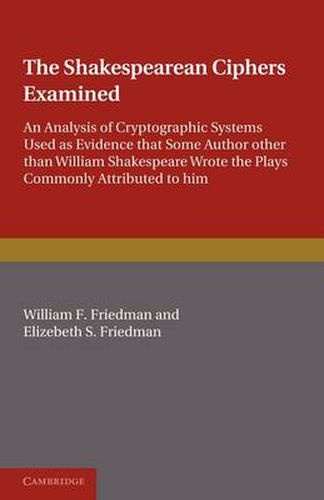Readings Newsletter
Become a Readings Member to make your shopping experience even easier.
Sign in or sign up for free!
You’re not far away from qualifying for FREE standard shipping within Australia
You’ve qualified for FREE standard shipping within Australia
The cart is loading…






William and Elizebeth Friedman were both researchers in cryptography at The Riverbank Laboratories. This 1957 book is the result of an insightful report that won the Friedmans the Folger Shakespeare Library literary prize. Within it, the Friedmans address theories, which, through the identification of hidden codes, call the authorship of Shakespeare’s plays into question. As ciphers were abundantly used in the sixteenth century, such coding is far from impossible. Accordingly, this work gives a fair and scientific hearing to those anti-Stratfordians whose theories were often dismissed completely. The Friedmans document the history and foundations of such theories, before thoroughly examining and critiquing a great number of them. Indeed, it has even been suggested that this text itself contains ciphers, making it of even greater interest to scholars of literary codes and cryptography, as well as those wishing to discover more about the various debates surrounding the authorship of Shakespeare’s plays.
$9.00 standard shipping within Australia
FREE standard shipping within Australia for orders over $100.00
Express & International shipping calculated at checkout
William and Elizebeth Friedman were both researchers in cryptography at The Riverbank Laboratories. This 1957 book is the result of an insightful report that won the Friedmans the Folger Shakespeare Library literary prize. Within it, the Friedmans address theories, which, through the identification of hidden codes, call the authorship of Shakespeare’s plays into question. As ciphers were abundantly used in the sixteenth century, such coding is far from impossible. Accordingly, this work gives a fair and scientific hearing to those anti-Stratfordians whose theories were often dismissed completely. The Friedmans document the history and foundations of such theories, before thoroughly examining and critiquing a great number of them. Indeed, it has even been suggested that this text itself contains ciphers, making it of even greater interest to scholars of literary codes and cryptography, as well as those wishing to discover more about the various debates surrounding the authorship of Shakespeare’s plays.